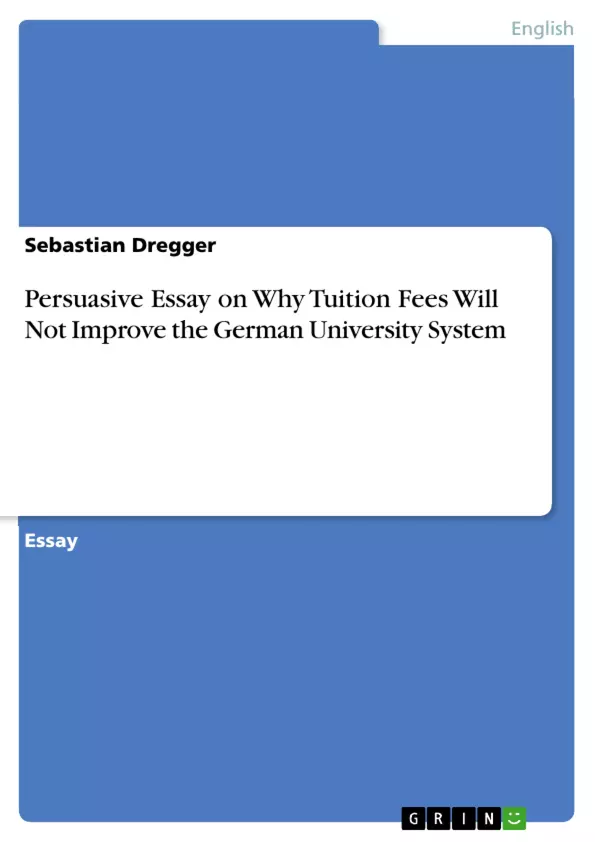Are tuition fees really the only way to improve the German university system? According to German politicians, this seems to be the case. They argue that only tuition fees can increase the financial resources of the bad-equipped German universities and that a tuition-based university system would force students to study more efficiently and to graduate much faster from college than they do today.
Table of Contents
- I. Introduction
- II. Thesis statement and outline
- III. Body
- A. Charging tuition fees – and cutting public expenses for universities at the same time
- B. Instead of tuition fees – there is a tax-based alternative to raise university budgets
- C. Tuition-based curricula – a severe restriction of academic freedom
- D. Charging tuition fees – a dangerous precedent towards a plutocratic fee-society
- IV. Conclusion
Objectives and Key Themes
This persuasive essay aims to refute the argument that charging tuition fees will improve the German university system. The author argues that tuition fees will not improve the financial situation of universities, and that there are alternative ways to increase funding. Furthermore, the essay explores how tuition fees may restrict academic freedom and ultimately create a system where access to education is dependent on wealth.
- The financial impact of tuition fees on university budgets
- Alternative financing models for universities, such as tax-based funding
- The effect of tuition fees on academic freedom and access to education
- The potential for tuition fees to create a plutocratic society
- The societal consequences of introducing tuition fees
Chapter Summaries
- I. Introduction: The essay introduces the debate surrounding tuition fees in the German university system. The author expresses skepticism about the benefits of charging tuition fees, laying the groundwork for their argument.
- II. Thesis statement and outline: The author presents their main argument: tuition fees will not improve the German university system. They outline the key points that will be discussed in the essay.
- III. Body: This section delves into the main arguments against tuition fees.
- A. Charging tuition fees – and cutting public expenses for universities at the same time: The author argues that any budgetary surplus generated by tuition fees would likely be offset by cuts in government funding for universities, leaving the overall financial situation unchanged.
- B. Instead of tuition fees – there is a tax-based alternative to raise university budgets: The essay proposes that a tax-based system, such as increasing the Value Added Tax, would be a fairer and more effective way to fund universities.
- C. Tuition-based curricula a severe restriction of academic freedom: The author contends that tuition fees would lead to a more rigid curriculum, restricting academic freedom by limiting students' ability to change majors, take additional courses, and pursue subjects with lower earning potential.
- D. Charging tuition fees – a dangerous precedent towards a plutocratic fee-society: This section explores the broader societal implications of tuition fees. The author argues that introducing tuition fees would set a precedent for charging fees for other public services, ultimately creating a society where access to essential services is determined by wealth.
Keywords
This persuasive essay focuses on the implications of tuition fees in the German university system, exploring themes such as university funding, academic freedom, social inequality, and the potential for a plutocratic society. The essay examines alternative financing models such as tax-based funding and explores the potential consequences of introducing fees on access to education and broader societal structures.
Frequently Asked Questions
Will tuition fees improve the quality of German universities?
The essay argues that tuition fees will not necessarily improve quality, as they are often offset by cuts in public funding, leaving the overall budget unchanged.
What are the alternatives to charging tuition fees in Germany?
The author proposes tax-based models, such as increasing the Value Added Tax, as a fairer way to raise university budgets without restricting access.
How do tuition fees affect academic freedom?
Fees may lead to rigid curricula and pressure on students to graduate faster, limiting their ability to explore different subjects or change majors.
Could tuition fees lead to social inequality?
Yes, the essay warns of a "plutocratic fee-society" where access to higher education depends on personal wealth rather than talent.
Do tuition fees make students study more efficiently?
While politicians argue fees force faster graduation, the author contends that financial pressure can actually harm the depth and quality of the learning process.
- Citar trabajo
- Sebastian Dregger (Autor), 2006, Persuasive Essay on Why Tuition Fees Will Not Improve the German University System , Múnich, GRIN Verlag, https://www.grin.com/document/61353



